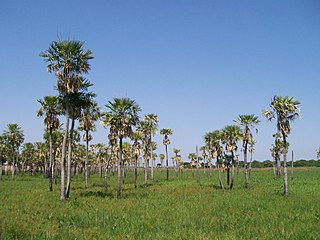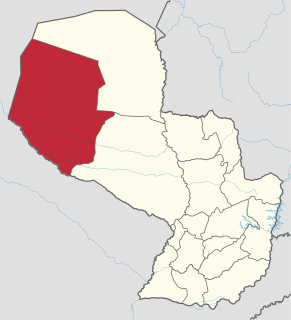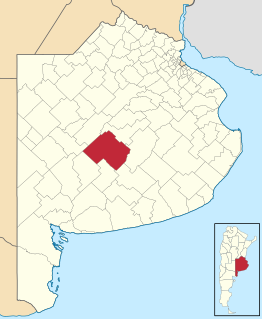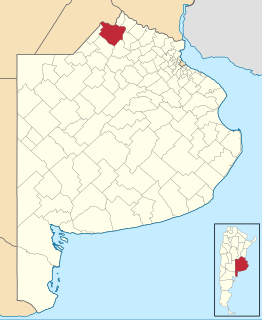
Chaco, officially the Province of Chaco, is one of the 23 provinces in Argentina. Its capital and largest city, is Resistencia. It is located in the north-east of the country.

Boquerón is a department in the western region of Paraguay. It is the country's largest department, with an area of 91,669 km2 (35,394 sq mi), but its population is only 45,617. The department includes the Russian Mennonite colonies of Fernheim, Menno and its administrative center Loma Plata and Neuland. The capital is Filadelfia. Other towns are General Eugenio A. Garay, Doctor Pedro P. Peña and Mariscal Estigarribia.

Corrientes is the capital city of the province of Corrientes, Argentina, located on the eastern shore of the Paraná River, about 1,000 km (621 mi) from Buenos Aires and 300 km (186 mi) from Posadas, on National Route 12. It has a population of 346,334 according to the 2010 Census. It lies opposite its twin city, Resistencia, Chaco.

Chaco Culture National Historical Park is a United States National Historical Park in the American Southwest hosting a concentration of pueblos. The park is located in northwestern New Mexico, between Albuquerque and Farmington, in a remote canyon cut by the Chaco Wash. Containing the most sweeping collection of ancient ruins north of Mexico, the park preserves one of the most important pre-Columbian cultural and historical areas in the United States.

Treze Tílias is a municipality located in the state of Santa Catarina, South Region, Brazil. It covers about 185.205 km² and sits about 470 km from the state capital, Florianópolis. The municipality population estimate for 2020 is 7,991. Treze Tílias was originally created on October 13, 1933.

Olavarría Partido is a partido in the central region of Buenos Aires Province in Argentina.

Pergamino Partido is a partido in the north of Buenos Aires Province in Argentina.

General Güemes is the largest and the northernmost department of Chaco Province in Argentina.

Libertad is a department of Chaco Province in Argentina.

Nueve de Julio is a department of Chaco Province in Argentina.

Presidencia de la Plaza is a department of Chaco Province in Argentina.

Primero de Mayo is a south eastern department of Chaco Province in Argentina.

San Lorenzo is a department of Chaco Province in Argentina.

Sargento Cabral is a department of Chaco Province in Argentina, named after Juan Bautista Cabral, a soldier in the Independence Wars.
Argentine Montenegrins are people born in Argentina of Montenegrin descent. During the early 1900s, Montenegrins from the Kingdom of Montenegro began emigrating to the country, and nowadays there are approximately 50,000 Montenegrins and descendants living in Argentina. Besides Poles (450,000) and Croatians (440,000) they are one of the most populous Slavic communities in Argentina. Currently most of them are located in the northern province of Chaco, while the remaining part lives in Buenos Aires, Tandil, Venado Tuerto, and General Madariaga, a town of around 5,000 inhabitants.

San Justo Department is a department of Córdoba Province in Argentina.

Villa Elisa is a city in the Central Department of Paraguay on the outskirts of Asuncion. It was the only colony that was inhabited by Swedish people in Paraguay and today is one of the most important and active cities that are part of the Metropolitan Area of the capital. Villa Elisa is an urban city and borders with Asuncion, in the Defensores del Chaco Ave some 16 km away from Asuncion's city centre. It was founded on March 22, 1938.

Juan Carlos Rousselot was an Argentine radio and television personality, newspaper publisher, and former mayor of the Greater Buenos Aires suburb of Morón.

Mennonites in Argentina belong to two quite different groups: conservative and very conservative Plautdietsch-speaking group of Russian Mennonites who are descendants of Friesian, Flemish and Prussian people, and converts to the Mennonite faith from the general Argentinian population. The Russian Mennonites are the third largest community of Mennonites in South America, with four colonies in Argentina. While Russian Mennonites have their own language and customs and live in colonies, converts to the Mennonite faith normally live in cities and speak Spanish and do not differ much from other Protestants in Argentina. Conservative ethnic Mennonites normally do not engage in missionary activities but look for a quiet and remote place where they can live according to their tradition. More liberal Mennonites are engaged in worldwide missionary work like other North American Protestant denominations. About one third of Mennonites in Argentina are conservative ethnic Mennonites who belong to the Altkolonier branch.


















